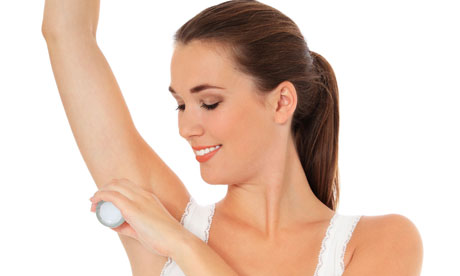
The dilemma
People worry about antiperspirants. Isn't it unnatural to stop yourself sweating? Don't they stop toxins getting out?
In recent years the media has covered small studies saying that antiperspirants cause breast cancer. Aluminium is used in antiperspirants to provide a coating over the sweat glands to stop the sweat getting out. A paper a few years ago in the Journal of Inorganic Chemistry said that women who had their breasts removed because of cancer had high levels of aluminium in the upper outer quadrant, where cancer most commonly occurs. It suggested that aluminium might be absorbed by the skin and cause changes in oestrogen receptors in breast cells. But no research has shown that aluminium has any direct link to breast cancer.
In fact, reports have not just been about antiperspirants but deodorants too. Deodorants (which neutralise sweat but don't block it) contain parabens, a form of preservative used in skin care products, which have also been implicated in breast cancer because they have oestrogen-like properties. Some breast cancers are known to grow more when exposed to oestrogens. But parabens have only a weak oestrogen effect.
There is the theory that shaving under your arms helps these substances get into your bloodstream through nicks in the skin. Then, if you apply antiperspirant, you can't sweat and the aluminium and parabens build up and cause cancerous changes in the cells around them. Men have lower rates of breast cancer, the theory goes, because they do not shave under their arms.
But should you turn your back on these modern sweat stoppers and try natural remedies instead?
The solution
A woman in the UK has a one in eight lifetime chance (ignoring personal risk factors) of getting breast cancer, and most women will shave their armpits and use deodorants. That doesn't mean they are linked. Cancer charities here and in the US are adamant that there is no evidence that either antiperspirants or deodorants increase the risk of breast cancer. These cancers occur in the upper outer part of the breast, not because this area is nearest the armpit, but as a result of the lymphatic drainage of the breast, which is determined by anatomy.
If you are having a mammogram you may be told not to use antiperspirant or deodorant on the day because aluminium can show up on the x-ray as tiny flecks that look like calcium – a possible sign of breast cancer.
Finding traces of aluminium or parabens in breast cancers doesn't mean they contributed to its growth. There is also no research showing that concentrations of these substances can actually build up in tissues.
Any worries that antiperspirants stop toxins getting out are also unfounded. You don't sweat anything toxic out of your body – just regular water and salt. Your liver and kidney do the elimination work.
Men suffer less from breast cancer, not because they have manly armpits but they don't usually have lots of oestrogen in their bodies, and they have less breast tissue than women.
There are some known risks for breast cancer: how much alcohol you drink, how much fat you carry, whether you take hormone replacement therapy. What you put under your arms isn't one of them.

